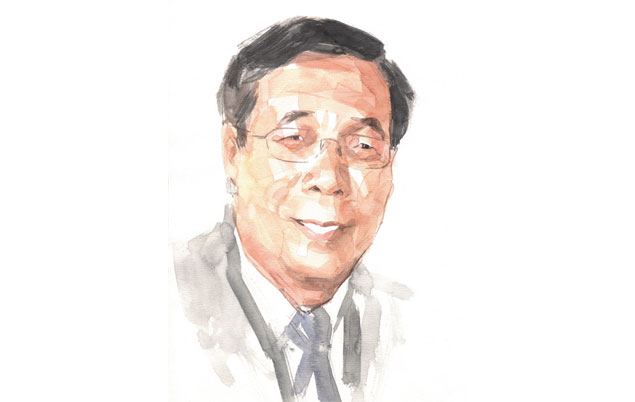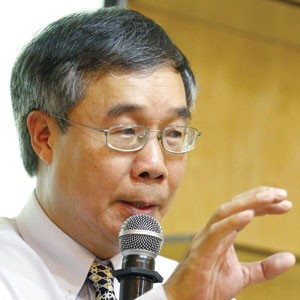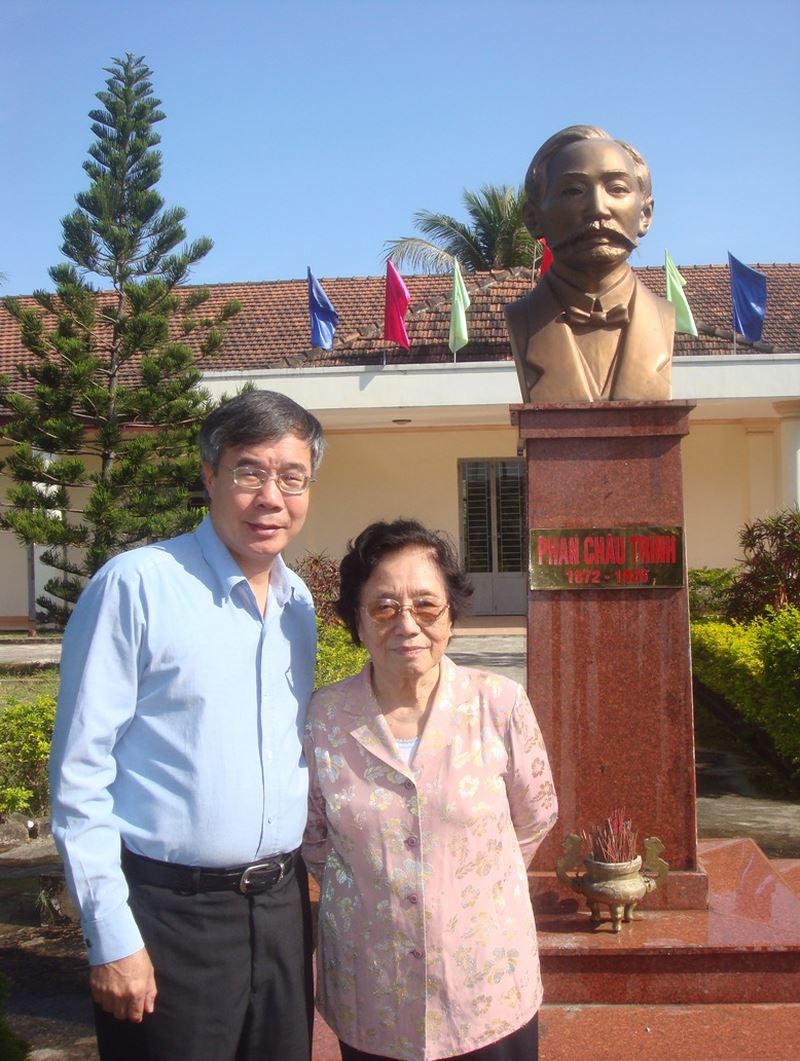
“Wherever you are, when your job no longer holds any appeal or a goal to strive for, it becomes like a golden handcuff. There were many times I wanted to break free from those ‘golden handcuffs,’ but I hesitated, thinking about what I already had.”
Mr. Trần Đức Cảnh graduated with a master’s degree in economics and completed a senior advisory course at the John F. Kennedy School of Government at Harvard University, and for many years was a member of the Northeast Consortium of Colleges and Universities in Massachusetts (Neccum).

Mr. Trần Đức Cảnh – Illustration by Hoàng Tường
After nearly 40 years of living, studying, and working in the United States, he has always been actively involved in educational development programs in Vietnam, such as the Fulbright Scholarship Program, the Vietnam Education Foundation (VEF), and serving as a bridge between U.S. and Vietnamese universities.
Even now, despite being busy with business, he frequently participates in seminars and talks to share information and experience about the U.S. university system with students interested in studying abroad.
The conversation with him started with the question: “Why in 2001, when you were the executive director of training and workforce development programs for the state of Massachusetts, did you decide to leave and start business projects in Vietnam?” He replied:
Many years of holding executive positions in the Massachusetts state government gave me a lot of experience, a good status, and stable family finances. But wherever you are, when your job no longer holds any appeal or a goal to strive for, it becomes like a golden handcuff.
There were many times I wanted to break free from those ‘golden handcuffs,’ but I hesitated, thinking about what I already had. Twenty years of working in America was too long for me. Compared to many others in similar positions, I was quite active in proposing, changing, and solving difficult problems, but I always felt constrained by political pressure and multiple bindings. Moreover, I had long wanted to return to work in Vietnam, so I decided to leave my position to start consulting for a U.S. financial organization looking to invest in Vietnam.
Later, I became the General Director for Selco – Vietnam (a U.S. company branch in Vietnam), with the aim of bringing solar power to remote areas. The job gave me the opportunity to travel everywhere and gain a deeper understanding of my country, especially in remote areas and islands.
I will never forget the happiness on the faces of people in remote areas when they first had electric light. I was even happier when our efforts were recognized by the U.S. State Department with the Corporate Excellence Award at the beginning of 2002.
It wasn’t until 2005 that I began to invest with a few friends in the InterContinental Hotel project in Nha Trang, my hometown. My current focus is on the Vĩnh Hội tourism project in Bình Định. My determination, along with some foreign partners, is to develop this place into one of the top tourism complexes in Asia, with six five-star hotels, an 18-hole golf course, and many other facilities.
* Why did you choose Bình Định as the location for your major investment project?

Additionally, Bình Định is a land with a long cultural history, associated with many great names in Vietnamese poetry such as Đào Tấn, Xuân Diệu, Chế Lan Viên, and Hàn Mặc Tử… This is a very important factor for developing the tourism industry. After many years of visiting and surveying most of Vietnam’s coastal areas, I found Vĩnh Hội to be a beautiful bay that still retains its pristine nature, close to Quy Nhơn city, and convenient for travel from Phù Cát airport—an ideal location for building and developing an international-class tourism area.
I highly appreciate the tourism development potential of Bình Định, although it is not as well-known for beach tourism as Nha Trang or Đà Nẵng, but I believe that visitors will soon discover Bình Định for its gentle, honest, and hospitable beauty.
* A project only receives the support of local authorities when it brings benefits to that locality. How will the Vĩnh Hội tourism area contribute to local development?
– The project will not only promote economic development but also contribute to the enhancement of local culture. If those involved in tourism serve visitors in an organized, systematic, and high-quality manner, Bình Định culture, in particular, and Vietnamese culture, in general, will have a strong opportunity to connect with world culture.
After many years of living in a multi-ethnic, multicultural society in the United States, I realize that investing in a high-end resort model with diverse amenities (golf courses, water sports, eco-tourism, culture, cuisine…) like the Vĩnh Hội tourism area will help minimize social evils, actively contributing to creating a healthier living environment for local residents.
The resort we are building will not be enclosed within walls but will be developed in a replicable model. Visitors here will be able to visit and use many external services such as entertainment, dining, and shopping… This will help develop the local economy. When the entire project is operational, we expect to employ up to 80% of the more than 4,200 staff at the Vĩnh Hội resort from Bình Định residents.
* It is known that for more than six years, your project has not even completed the land clearance stage. Could the lengthy investment procedures be causing delays in your project’s implementation?
– Experience shows that domestic real estate projects involving relocation, especially large-scale projects like Vĩnh Hội, always progress more slowly than expected. Currently, we are concentrating intensely on compensation and relocation, preparing the site for the upcoming construction of hotels and golf courses.
If you are used to working according to a plan, process, and timeline as in the U.S., investing in Vietnam often presents two main challenges: uncontrollable time delays and many arising issues during business operations.
Managers are often “caught up” in handling situations instead of dedicating time to building and implementing the company’s plans. This often leads to delays, inefficiency, and even project misalignment. Foreign investors find it difficult to adapt to the working style in Vietnam, especially when they frequently have to report progress to the Board of Directors in the U.S., as I have done.
Could that be why the investment environment in Vietnam is less attractive to foreign entrepreneurs in general and overseas Vietnamese in particular?
For foreign entrepreneurs, this may be true, but for overseas Vietnamese, there are three other reasons:
(1) Career opportunities or business prospects in the U.S. are quite good and stable but require a lot of time, resources, and mental effort;
(2) Most Vietnamese in the U.S. have relatively good incomes, but not many have sufficient capital to invest back home;
(3) Most overseas Vietnamese left their homeland during the 1970s and 1980s when the country was still struggling with many difficulties. Many are still haunted by the past and do not feel entirely secure about returning to invest.
* What do you think about the figure of 5 billion USD in remittances from the U.S. to Vietnam each year?
– Most of this money is sent by overseas Vietnamese to help their relatives in the country, not as business investment. If Vietnam had a more open and efficient investment environment, this amount would certainly be much higher and would be a significant driver for economic development, as a Western saying goes: “Build a good playground, and the players will come.”
* Phan Châu Trinh University is one of your major interests in Vietnam, with a desire to contribute to educational reform in the country. What are the differences at Phan Châu Trinh University that you aim to build to create changes in higher education and training?
– For a long time, I have often likened our higher education system to a traveler walking on a road at twilight because we are almost groping step by step, just moving forward and hoping we are on the right path.
In reality, reform must start from the roots to be effective. Phan Châu Trinh University is focusing on two factors that I believe are most important in educational reform, especially in higher education.
The first is to change the admission process, teaching methods, and learning approaches, leading to a better understanding of the roles, responsibilities, and relationships between teachers, students, schools, families, and the community.
The second is to move towards a liberal education system, emphasizing the training of individuals with ethical qualities, independent and creative thinking, aspirations, and academic abilities to contribute to the long-term development of society.
“Enlighten the people’s intellect, invigorate the people’s spirit, and cultivate the people’s livelihood.” Phan Châu Trinh’s saying truly has great value in the context of today’s education and society and has been the guiding principle for the development of the university since its inception.
In addition, Phan Châu Trinh University must also invest more in infrastructure and gather more dedicated faculty aligned with the university’s goals. This work cannot be done overnight but requires a long process of building and development.
* Today, students have many easier choices at universities and colleges across the country. Moreover, other schools focus on investing in facilities to attract students, especially international schools. How will Phan Châu Trinh University attract students?
– Hội An, where Phan Châu Trinh University is established, is a city rich in traditional culture with a peaceful atmosphere, completely suitable for the development of a university oriented towards science, social sciences, and humanities, as envisioned by writer Nguyên Ngọc, myself, and many prominent figures in the education sector.

Trần Đức Cảnh taking a commemorative photo with Mrs. Nguyễn Thị Bình, former Vice President, and founding member of Phan Châu Trinh University.
Education cannot progress through temporary glitz; it must be built for the long term, so that students always feel proud of a school that not only provides knowledge but also shapes each individual for society. Facilities are necessary tools to serve higher education goals, but the most important factor is the university’s reputation. Given the modest conditions we have now, the university’s immediate goal is to meet some of the educational and training needs for students in the central region.
A clear example is Harvard University. In 1636, John Harvard founded the school with just one teacher, a class of nine students, and a library of 400 books. Thanks to the right ideas and direction, Harvard has become one of the world’s leading universities over the centuries.
Many years of experience in developing human resource policies for the state of Massachusetts have shown that evaluating and developing each individual’s potential is extremely important, as each person is an individual with certain potentials, just as writer Nguyên Ngọc observed. Some people are smart in one field, while others excel in two or three different fields. Mass education, as in our country, often does not highlight each person’s outstanding traits.
It is not an exaggeration when a Harvard University administrator said that selecting good students accounts for 90% of the success in training a student. This is like planting a tree—finding and choosing the best and most suitable seedlings is the most important task; the process of nurturing and watering afterward only accounts for about 10% of the tree’s development.
* Are the standout traits of candidates you mentioned usually reflected in the interview?
– Most of an individual’s standout traits are shown during the interview. Candidates not only need to answer questions fully but also demonstrate their talent, dynamism, leadership qualities, and desire to serve the community.
Interviewers often ask questions such as: Why should Harvard accept you? If admitted, how will you contribute to the Harvard community and society in the future? What is the most important thing to you? Who do you love the most? Who is your idol? What do you think your best friend 25 years from now will be like? What is the best solution for Syria today?… and other open-ended and challenging questions.
* With ten years of experience in admissions for Harvard University, can you share what applicants need to have to be admitted to Harvard?
There is no common formula for getting into Harvard University; applicants must have a passion and aspiration to pursue a certain dream and view academia as a means to achieve their goals.
Harvard is one of the best places to provide the resources for students to realize their dreams both during and after graduation, as this university has a global network connected to the school (Harvard) and its alumni worldwide.
Applicants must have strong English skills, top academic and SAT I and II scores. Essays prepared in the application must reflect the applicant’s thinking and style. Letters of recommendation from teachers are also quite important, clearly expressing the student’s abilities, aspirations, and spirit.
Harvard only selects about 2,050 students from 34,000 applicants worldwide, so the chances of admission are very slim, typically reserved for those who excel in almost all of the above requirements or are exceptionally outstanding in a particular field.
Essays that grab attention and strong personality traits displayed during the interview are key to success, but sometimes students also need a bit of luck.
* What do you think about Vietnamese students in terms of expressing their personality?
– Most Vietnamese students are weak in expressing their style and personality, reluctant to be different, and tend to follow the crowd. Perhaps this is due to the culture, the rigid and theory-focused education system, so most students lack initiative in their work and are less confident in communicating with foreigners, which can sometimes be mistaken for a lack of competence.
I would also like to note that extracurricular activities are an important requirement when applying to Harvard University and many prestigious universities in the United States. An application is highly regarded when the candidate has participated and achieved success in some extracurricular activities such as sports, music, literature, art, science…
Harvard currently has up to 400 student-led clubs and organizations, most of which are funded by the school. Harvard students are very active in both internal and external activities to become more dynamic while demonstrating their abilities in collective activities.
* Why do you think Harvard is not the only path?
– It’s not just Vietnamese students; students in the U.S. and many other countries worldwide also dream of stepping into Harvard University, perhaps because Harvard’s brand has been maintained and developed so well by the contributions of its students over the centuries.
However, I believe that Harvard is not the only path for Vietnamese and international students. The top fifty universities in the United States, such as the Massachusetts Institute of Technology (MIT), Caltech, Yale, Princeton, Stanford, Chicago… or top four-year colleges like Williams, Amherst, Wellesley, Pomona… all have their unique strengths and offer students many options.
Therefore, top students may not choose Harvard or other well-known big schools but may study at top four-year colleges. The environment and common space of these schools are usually more intimate and friendly; professors and lecturers often focus more on teaching than research. Additionally, with a student body of only around 2,500, the distance between teachers, students, and the school is closer.
* Thank you for the conversation.
Source: https://doanhnhansaigon.vn/tro-chuyen-voi-doanh-nhan/cong-viec-hanh-chinh-nhu-chiec-cong-bang-vang-1048968.html